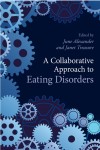The fine line between caring and over-caring
The fine line between caring and over-caring

A Collaborative Approach to Eating Disorders - edited by June Alexander and Janet Treasure is a 'must read' for clinicians, and for carers who want to understand how best to help their loved one recover.
What does a mother do when her young adult daughter calls and says: ‘I want you to move (500km) to the city to look after me while I study, I can’t cope alone.’ The mother has a job she likes, friends, and a lovely home in the town where she has raised her children and lived for 20 years. She feels torn, because the daughter blames her for her eating disorder (‘you have not done enough to help me’, ‘if you don’t come, I won’t eat’). What would you do?
Certainly, carers need tools to survive and to help their loved one recover from the illness.
Skills training programmes like those outlined in A Collaborative Approach to Eating Disorders, Chapter 13 – Involving carers: a skills-based learning approach (Elizabeth Goddard, Simone Ranker and Janet Treasure), can make the world of difference between a parent coping and not coping, and between a child recovering or not recovering.
Such programmes help carers, among other things, to find a balance; to set boundaries and to not accept the symptomatic demands of the ED, but to allow the person with the eating disorder to take control of their choices and to develop a sense of mastery and skill develop as they learn through trial and error. This is the dolphin. There are as many different types of carers as there are people, but a dolphin represents a carer who is able to be consistently supportive but firm in setting boundaries and compassionate in supporting the person to cope with these. In one way a dolphin is like a lifebelt for the person with the eating disorder. They will be there to support the person when needed but can nudge and guide them towards independence, encouraging them to make their own decisions and helping them to develop resilience. When a person has the tools to cope with stress they will be less likely to turn to the ED as a strategy.
A mother, V, describes below her experience as an “over-carer” and the leap of faith that skills-based workshops enabled her to take in order to allow her daughter to experience life herself and trust her to make her own decisions as an adult:
“With my changes in attitude and behaviour, H quickly got into recovery…As her mother (carer) I had wanted to do everything. But helping a child recover from an ED is about setting and recognising the boundaries and being open to being told how to do things.
When H rang and told me she was going to commit suicide I told her that that was her problem and that she would have to deal with it – and said ‘goodbye’. I felt dreadful but I had learnt and recognised that nothing I could say would prevent every single solitary thing from happening and fearing it might happen – I was devastated saying what I did but I had to rise to this challenge for the sake of H’s recovery. Half an hour later H called back and asked what I was doing at the weekend as though nothing had happened.
The point is, from that moment progress was made. The whole thing hung on the fact that I had digested the lessons of setting boundaries and taking a less hands on approach. As a mother it was very difficult to step back. No one likes seeing anyone sick. I also have a brother who has schizophrenia and has often threatened to end his life but does not do so; but H had actually attempted it, so for me to stand back and refrain from rescue mode was a bigger challenge. She chose to live. I was very relieved to receive her phone call confirming this.”
* Read more about the skills-based learning approach.
* Parents, at crunch times it helps to focus on what you CAN do – this FEAST site has some great tips.





